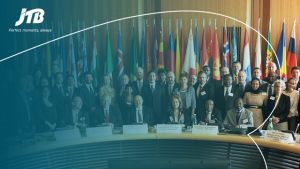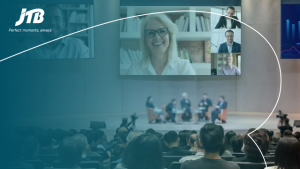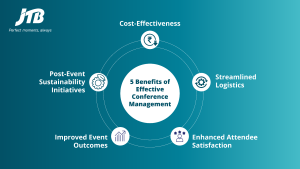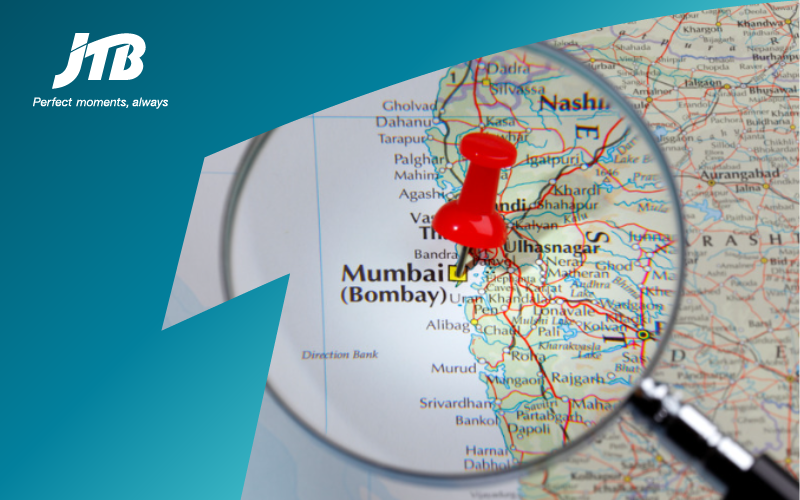Effective conference management stands as a cornerstone of successful corporate events and meetings. It revolves around the meticulous planning and seamless coordination of myriad details, ensuring every aspect contributes to a cohesive and impactful experience.
Choosing the right venue is important for the event’s goals. Planning engaging speaker sessions and handling logistics are also key. Each part is vital for the success of the conference.
This blog explores the key parts of conference management. It highlights how important it is for successful corporate meetings. It also provides useful tips for getting the best results.
What is Conference Management?
Conference management includes careful planning, coordination, and execution of events. These events aim to bring together participants for specific purposes. These purposes can be professional development, academic, industry, or trade conferences.
It encompasses all logistical and operational details, including venue selection, program development, attendee registration, catering, audiovisual needs, and post-event evaluation.
Effective conference management is essential for ensuring that events and meetings run smoothly and successfully. It begins with clearly defining the goals and expectations of the organisers.
This process helps with planning and execution. It makes sure the event meets its goals. It also provides a smooth experience for attendees and stakeholders.
Beyond the event itself, conference management involves evaluating its outcomes and impact. This evaluation uses feedback from attendees and performance analysis. It helps organizers see what worked well and where they can improve for future events.
Conference management is very important for organizing effective and memorable conferences. These events leave a lasting impression on participants.
Importance Matrix of Conference Management
Effective conference management is crucial for the success and impact of any event. It ensures that all aspects of the conference—from planning to execution and evaluation—are handled with precision and care. Here’s why conference management matters:
- Enhanced Attendee Experience: Well-managed conferences run smoothly, offering clear communication, efficient logistics, and thoughtful planning. This creates a positive environment that enhances participant satisfaction and engagement throughout the event.
- Achievement of Organisational Goals: A well-managed conference can contribute significantly to organisational objectives such as increasing brand visibility, fostering industry connections, or showcasing thought leadership. Every detail is aligned with strategic goals to ensure the event serves its purpose effectively.
- Measurement of Event Success: Effective conference management includes careful evaluation of attendee feedback, performance metrics, and financial outcomes. This data-driven approach helps organisers gauge the event’s effectiveness, identify strengths, and pinpoint areas for improvement. It ensures continuous enhancement of conference quality and relevance for future events.
Conference management is more than just organising an event—it’s about creating meaningful experiences, achieving organisational objectives, and driving continuous improvement in professional gatherings.
Types of Conferences
Conferences come in various formats and serve different purposes. Understanding the types of conferences can help in planning and managing them effectively. Here are some common types:
1. Academic Conferences
These conferences are primarily focused on scholarly and research-based topics. They provide a platform for researchers, educators, and students to present their findings, share knowledge, and engage in discussions. Examples include scientific symposiums, educational conferences, and research workshops.
2. Business Conferences
These events are organised for professionals in the business sector to discuss industry trends, share best practices, and network with peers. They often feature keynote speakers, panel discussions, and breakout sessions. Examples include trade shows, industry expos, and corporate retreats.
3. Professional Development Conferences
These conferences aim to enhance the skills and knowledge of professionals in various fields. They offer workshops, training sessions, and certification programs. Examples include medical conferences, legal seminars, and tech summits.
4. Government and International Conferences
Government agencies or international organisations organise these conferences to address global issues, policy development, and international cooperation. Examples include United Nations conferences, diplomatic summits, and public policy forums.
5. Hybrid Conferences
With the advancement of technology, hybrid conferences have become increasingly popular. These conferences combine in-person and virtual elements, allowing participants to join remotely. This format offers flexibility and broadens the reach of the event.
6. Consumer Conferences
These are organised for consumers and the general public to engage with brands, products, and services. They often include product launches, demonstrations, and interactive activities. Examples include tech gadget expos, car shows, and fashion events.
Understanding the different types of conferences helps in tailoring the planning and management strategies to suit the specific needs and goals of each event. Whether it’s an academic symposium or a business expo, professional conference management ensures that every aspect is meticulously organised for a successful outcome.
5 Benefits of Effective Conference Management
Professional conference management offers numerous advantages that contribute to the success and effectiveness of a conference.
- Cost-Effectiveness: Professional conference management ensures efficient budgeting and resource allocation. By negotiating with vendors and suppliers, conference managers can secure competitive rates for venues, catering, AV equipment, and other corporate event services. This strategic approach helps optimise expenses while maximising the event’s impact and value.
- Streamlined Logistics: Managing the intricate logistics of a conference—from venue setup to attendee registration and technical support—requires expertise and attention to detail. Professional conference managers streamline these processes, ensuring everything runs smoothly and according to plan. This includes coordinating schedules, managing timelines, and anticipating and addressing potential challenges proactively.
- Enhanced Attendee Satisfaction: Well-managed conferences prioritise attendee experience. Clear communication, seamless registration processes, comfortable accommodations, engaging program content, and quality catering contribute to overall attendee satisfaction. When attendees have a positive experience, they are more likely to participate actively, network effectively, and leave a favourable impression of the event and its organisers.
- Improved Event Outcomes: Professional conference management leads to better event outcomes by aligning every aspect of the conference with its objectives. Whether the goal is to educate, inspire, network, or generate leads, meticulous planning and execution ensure that the event delivers measurable results. Through post-event evaluation and analysis, organisers can assess the event’s success, identify areas for improvement, and leverage strengths for future events.
- Post-Event Sustainability Initiatives: Many conferences today emphasise sustainability. Professional conference managers can implement eco-friendly practices such as waste reduction, energy conservation, and carbon offsetting measures. These initiatives not only demonstrate corporate social responsibility but also appeal to environmentally-conscious attendees and stakeholders.
Professional conference management not only ensures cost-effectiveness and streamlined logistics but also enhances attendee satisfaction and improves overall event outcomes. By entrusting conference management to experts, organisers can focus on strategic goals and objectives while ensuring a memorable and impactful experience for all participants.
Factors Contributing to Effective Conference Management
Effective conference management is a multi-faceted process that requires meticulous planning, efficient coordination, and comprehensive execution. Here are the key factors that contribute to successful conference management:
1. Pre-Conference Planning
- Clear Objectives and Goals: Define the purpose of the conference, its target audience, and the expected outcomes.
- Budget Management: Establish a realistic budget covering all aspects, from venue and logistics to marketing and contingency plans.
- Venue Selection: Choose a location that is accessible, has adequate facilities, and aligns with the conference’s theme and size.
- Agenda Setting: Develop a detailed agenda, including keynotes, breakout sessions, and networking opportunities.
- Speaker Management: Secure knowledgeable and engaging speakers who can add value to the event and meeting management.
- Logistic Management – Manage the logistics such as transport, travel arrangements etc.
2. Marketing and Promotion
- Targeted Marketing: Use various channels (social media, email campaigns, industry publications) to reach the intended audience.
- Engaging Content: Create compelling promotional materials that highlight the conference’s unique value propositions.
- Early Bird Offers: Encourage early registrations through discounts and special offers.
3. On-Site Management
- Efficient Registration: Implement a streamlined registration process to ensure smooth check-ins.
- Technical Support: Ensure reliable audio-visual equipment and technical support throughout the event.
- Attendee Engagement: Foster interaction through Q&A sessions, workshops, and networking opportunities.
- Logistics Coordination: Manage logistics seamlessly, including transportation, accommodation, and catering services.
- Helpdesk Support – Set up helplines and smoother coordination opportunities for all stakeholders.
4. Post-Event Evaluation
- Feedback Collection: Gather corporate event attendees, speakers, and sponsors’ feedback to assess the event’s success and identify areas for improvement.
- Data Analysis: Analyse attendance, engagement metrics, and ROI to measure the conference’s impact.
- Follow-Up Communication: Maintain engagement with attendees through thank-you emails, post-event surveys, and sharing of event highlights.
- Accurate Invoicing: Collect the bills and signed copies of the event and any additional feedback or points to consider in the generation of invoices on time.
5. Additional Factors
- Risk Management: Identify potential risks and develop contingency plans to handle unexpected issues.
- Sustainability Practices: Implement eco-friendly practices to minimise the event’s environmental footprint.
- Innovation and Technology: Use innovative tools and technologies to enhance the attendee experience and streamline operations.
By focusing on these factors, conference managers can ensure that their events are well-organised, impactful, and memorable for all participants.
How to Manage Conferences Effectively?
Managing a conference effectively requires a combination of strategic planning, clear communication, and meticulous execution. Here are essential tips and strategies to ensure your conference is a success:
- Clear Communication: Establish open lines of communication with all stakeholders, including speakers, sponsors, attendees, and team members. Ensure everyone understands their roles and responsibilities, and provide regular updates throughout the planning and execution phases. Effective communication is crucial for coordinating efforts and ensuring everyone is on the same page.
- Detailed Planning: Engage in thorough and detailed planning, considering every aspect of the conference. Develop contingency plans for potential issues to ensure smooth operations even when unexpected challenges arise. This proactive approach helps in managing risks and ensuring that the event runs seamlessly.
- Leveraging Technology: Use reliable event management software and technical support like JTB Connect to streamline processes and enhance the attendee experience. Technology can assist with registration, scheduling, communication, and feedback collection, making overall management more efficient.
- Flexibility and Adaptability: Anticipate and prepare for unexpected changes or challenges that may arise during the conference. Have contingency plans in place and be ready to adjust schedules, logistics, and programs as needed to ensure a seamless experience for participants. Flexibility allows you to handle issues promptly and maintain the event’s flow.
- Attention to Detail: Pay close attention to every aspect of conference planning, from venue setup to program content and attendee experience. Ensure all logistics are meticulously planned and executed to create a professional and welcoming atmosphere. Attention to detail ensures that nothing is overlooked, contributing to the event’s overall success.
- Feedback Loops: Implement systems to gather and act on feedback from participants, speakers, and sponsors. Use this feedback for continuous improvement. Post-event evaluations and surveys provide valuable insights that can be used to refine your approach and enhance future conferences.
- Post-Event Follow-Up: Conduct thorough evaluations and gather feedback from participants, speakers, and sponsors after the conference. Analyse and use these insights to refine your approach and enhance future conferences. Effective follow-up demonstrates your commitment to improvement and helps build stronger relationships with stakeholders.
By implementing these best practices in communication, flexibility, attention to detail, and post-event follow-up, you can effectively manage conferences that meet objectives, exceed expectations, and leave a lasting positive impression on attendees and stakeholders alike.
Conclusion
Successful conference management relies on meticulous planning, effective coordination, adept on-site execution, and thorough evaluation. These elements are crucial for ensuring that conferences achieve their objectives and leave a lasting impact on attendees.
Thorough pre-conference planning sets the stage by defining clear goals, managing budgets, and establishing timelines. Effective coordination with vendors and partners assures seamless logistics and high-quality services throughout the event.
During the conference, adept on-site management plays a pivotal role in handling challenges swiftly and ensuring everything runs smoothly. JTB India excels in providing robust on-site management services that mitigate risks and enhance attendee satisfaction.
Comprehensive post-event evaluation and reporting provide valuable insights for continuous improvement, ensuring each conference builds upon successes and addresses areas for enhancement.



























